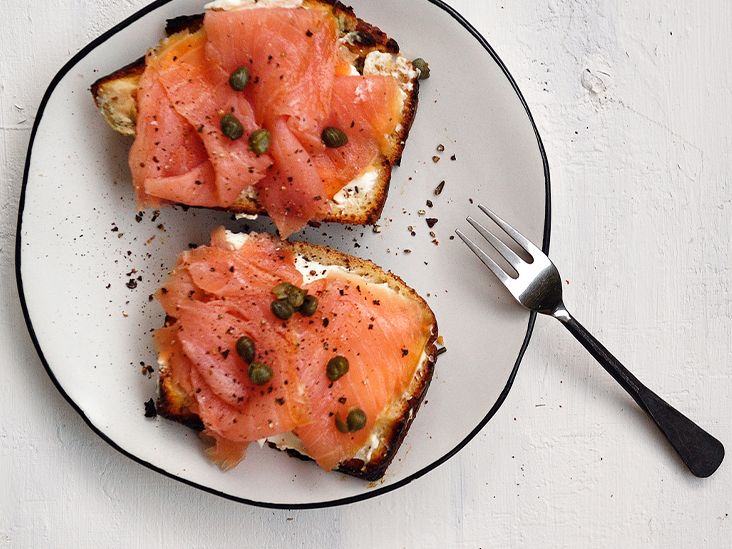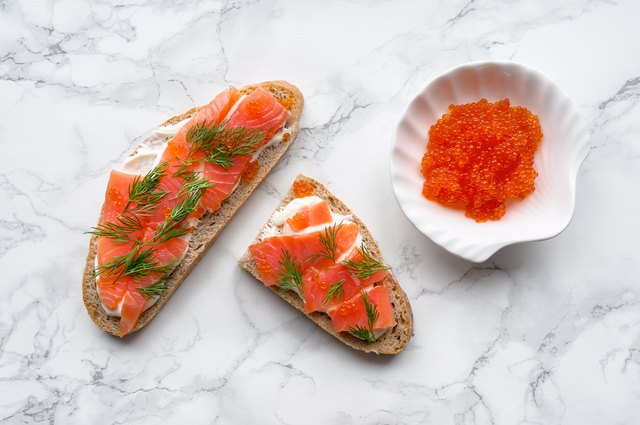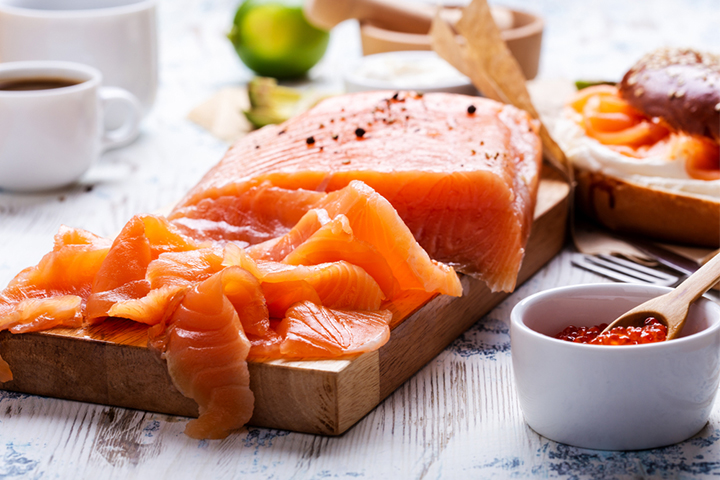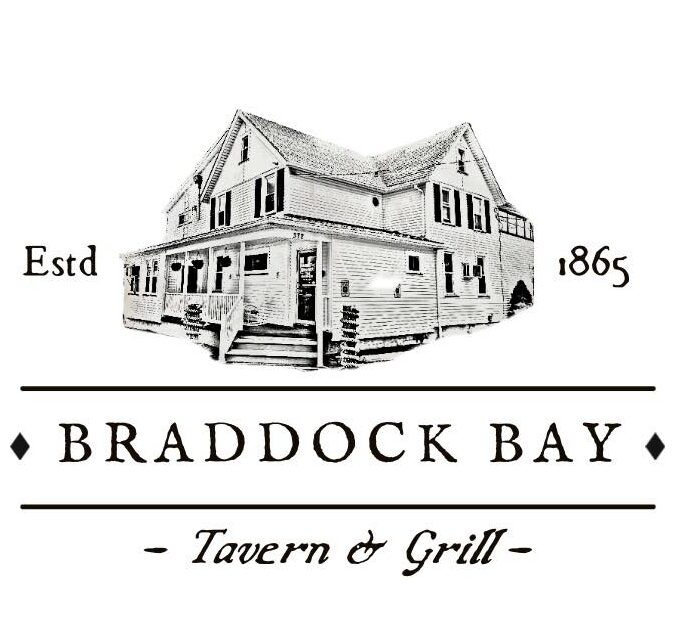Understanding Smoked Salmon

Smoked salmon is a popular seafood delicacy that is prepared by smoking the fresh salmon fillets. It is known for its distinct flavor and rich texture. The smoking process involves exposing the fish to smoke from burning wood chips or other aromatic ingredients, which enhances its taste and extends its shelf life. Smoked salmon can be cold-smoked or hot-smoked, with the former being less cooked and the latter having a firmer texture. Cold-smoked salmon is typically served raw or lightly cooked, while hot-smoked salmon is fully cooked and can be enjoyed in various dishes. This delectable seafood is a favorite among many, but pregnant women need to be mindful of the potential risks and guidelines associated with its consumption.
What Is Smoked Salmon?
Smoked salmon is a delicacy made by smoking fresh salmon fillets. It undergoes a process where the fish is exposed to smoke from burning wood chips or aromatic ingredients, which enhances its flavor and extends its shelf life. There are two types of smoked salmon: cold-smoked and hot-smoked. Cold-smoked salmon is less cooked, often served raw or lightly cooked. On the other hand, hot-smoked salmon is fully cooked and can be enjoyed in various dishes. Smoked salmon is known for its distinct taste, rich texture, and is a favorite choice for seafood lovers.
Nutritional Value Of Smoked Salmon
Smoked salmon is not only delicious but also a nutritious choice for pregnant women. It is a good source of protein, which is essential for the development of the baby’s muscles and tissues. Smoked salmon is also rich in omega-3 fatty acids, which promote brain and eye development in the fetus. Additionally, it contains important nutrients like vitamin B12, which helps with red blood cell production, and vitamin D, which supports bone health. However, it is important to consume smoked salmon in moderation and opt for varieties that are low in sodium to minimize any potential risks during pregnancy.
Risks And Benefits

Eating smoked salmon during pregnancy comes with both risks and benefits. The main risk lies in consuming unheated, cold-smoked varieties, as they may contain harmful bacteria and parasites. However, hot-smoked salmon is fully cooked and does not pose the same risks. The benefits of eating smoked salmon during pregnancy include its high protein content, which is important for the baby’s muscle and tissue development, as well as its rich omega-3 fatty acids, which support brain and eye development. It also provides essential nutrients like vitamin B12 and vitamin D. Pregnant women should choose low-sodium varieties and consume smoked salmon in moderation to maximize the benefits and minimize the risks.
Health Risks Associated With Eating Smoked Salmon During Pregnancy
Eating smoked salmon during pregnancy does come with some health risks. The main concern is consuming unheated, cold-smoked varieties, as they may contain harmful bacteria and parasites such as Listeria and tapeworm. These can cause serious infections and pose a risk to both the mother and the baby. It is essential to avoid consuming uncooked cold-smoked salmon to minimize the risk of these infections. Opting for hot-smoked salmon, which is fully cooked, or choosing other safe alternatives can help ensure a healthy pregnancy.
Benefits Of Consuming Smoked Salmon For Pregnant Women
Consuming smoked salmon can provide several benefits for pregnant women. Smoked salmon is a rich source of omega-3 fatty acids, which play a crucial role in the development of the baby’s brain and eyes. These fatty acids also support the mother’s cardiovascular health and help reduce the risk of preterm birth. Additionally, smoked salmon is a great source of high-quality protein, which is essential for the growth and development of the baby. Including smoked salmon in a balanced diet can contribute to a healthy pregnancy and support the overall well-being of both the mother and the baby.
Guidelines And Recommendations

When it comes to consuming smoked salmon during pregnancy, it is important to follow certain guidelines and recommendations. Here are a few key points to keep in mind:
- Choose cooked options: Opt for hot-smoked salmon that has been thoroughly cooked to an internal temperature of 165℉. Avoid cold-smoked salmon as it carries a higher risk of contamination.
- Check product labels: Look for labels that indicate the fish has been pasteurized or cooked, as this ensures safer consumption.
- Practice good hygiene: Always wash your hands before handling any smoked salmon and make sure the fish is stored properly to prevent bacterial growth.
- Consult your healthcare provider: If you have any concerns or questions about consuming smoked salmon during pregnancy, it is best to consult your doctor or healthcare provider for personalized advice.
Remember, following these guidelines can help ensure a safer and healthier pregnancy.
Guidelines For Pregnant Women Regarding Smoked Salmon Consumption
Pregnant women should follow certain guidelines when it comes to consuming smoked salmon. It is recommended to choose cooked options, such as hot-smoked salmon, that have been thoroughly cooked to an internal temperature of 165℉. Cold-smoked salmon should be avoided as it carries a higher risk of contamination. It is important to check product labels for indications that the fish has been pasteurized or cooked. Practicing good hygiene, such as washing hands before handling, and proper storage to prevent bacterial growth is crucial. Consulting with a healthcare provider for personalized advice is also recommended.
Expert Recommendations On Safe Intake Levels
Experts generally recommend that pregnant women limit their intake of smoked salmon due to the potential risks associated with high sodium content. The American Pregnancy Association advises pregnant women to consume no more than 1500-2300 mg of sodium per day. Since 5 ounces (100 grams) of smoked salmon can contain 30% or more of the daily sodium limit, it is best to consume it in moderation. It is important to consult with a healthcare provider for personalized advice on safe intake levels, as each pregnancy is unique.
Alternative Options

There are alternative options available for pregnant women who wish to avoid or minimize their consumption of smoked salmon. Some healthy substitutes for smoked salmon include cooked fresh salmon, which provides similar nutritional benefits without the risks associated with smoked salmon. Other alternatives include grilled or baked fish, such as trout or halibut, which can provide a delicious and safe alternative. Additionally, vegetarian options such as chickpea salad or avocado toast can also be tasty alternatives for pregnant women looking to satisfy their cravings for a savory meal. It is important to consult with a healthcare provider for personalized dietary recommendations during pregnancy.
Healthy Alternatives To Smoked Salmon For Pregnant Women
There are alternative options available for pregnant women who wish to avoid or minimize their consumption of smoked salmon. Some healthy substitutes for smoked salmon include cooked fresh salmon, which provides similar nutritional benefits without the risks associated with smoked salmon. Other alternatives include grilled or baked fish, such as trout or halibut, which can provide a delicious and safe alternative. Additionally, vegetarian options such as chickpea salad or avocado toast can also be tasty alternatives for pregnant women looking to satisfy their cravings for a savory meal. It is important to consult with a healthcare provider for personalized dietary recommendations during pregnancy.
Substitutes For Smoked Salmon In Pregnancy Diets
In order to avoid the potential risks associated with smoked salmon, there are several substitutes that pregnant women can incorporate into their diets. Cooked fresh salmon is a healthy alternative that provides similar nutritional benefits without the concerns of smoked salmon. Grilled or baked fish, such as trout or halibut, can also be delicious and safe options. Additionally, vegetarian alternatives like chickpea salad or avocado toast can satisfy savory cravings. It’s essential for pregnant women to consult with their healthcare provider for personalized dietary recommendations during pregnancy to ensure a healthy and balanced diet.
Precautions And Preparation

When it comes to consuming smoked salmon during pregnancy, there are a few precautions and preparation steps to keep in mind. Firstly, always make sure that the smoked salmon is properly cooked to eliminate any potential bacteria or parasites. It’s important to avoid consuming raw or undercooked fish during pregnancy. Additionally, pregnant women should carefully handle and store smoked salmon to prevent cross-contamination with other foods. It’s recommended to follow proper food safety practices, such as storing smoked salmon at the appropriate temperature and consuming it within a safe timeframe. By taking these precautions and practicing proper food handling, pregnant women can enjoy smoked salmon safely.
Precautions To Take When Eating Smoked Salmon During Pregnancy
When it comes to consuming smoked salmon during pregnancy, there are a few precautions to keep in mind. Firstly, always make sure that the smoked salmon is properly cooked to eliminate any potential bacteria or parasites. It’s important to avoid consuming raw or undercooked fish during pregnancy. Additionally, pregnant women should carefully handle and store smoked salmon to prevent cross-contamination with other foods. It’s recommended to follow proper food safety practices, such as storing smoked salmon at the appropriate temperature and consuming it within a safe timeframe. By taking these precautions, pregnant women can safely enjoy smoked salmon.
Safe Ways To Prepare And Consume Smoked Salmon
When preparing and consuming smoked salmon during pregnancy, it is important to follow safe practices. Here are some recommendations:
- Cooking: Ensure that the smoked salmon is properly cooked before consuming. This can be done by heating it to an internal temperature of 165℉.
- Storage: Store smoked salmon at the appropriate temperature to prevent bacterial growth. Keep it refrigerated at 40℉ or below and consume it within the recommended timeframe.
- Avoid cross-contamination: Handle smoked salmon separately from other foods to prevent cross-contamination. Clean utensils and surfaces thoroughly after use.
- Quality check: Purchase smoked salmon from reputable sources and check for any signs of spoilage, such as a strong odor or sliminess.
By following these precautions, pregnant women can safely enjoy smoked salmon while minimizing any potential risks.
Conclusion

In conclusion, pregnant women can safely consume smoked salmon if proper precautions are taken. While there are potential health risks associated with consuming smoked salmon during pregnancy, such as the presence of harmful bacteria, these risks can be minimized by following guidelines for safe handling, cooking, and storage. Additionally, pregnant women can benefit from the nutritional value of smoked salmon, including its high protein and omega-3 fatty acid content. It is important to consult with a healthcare provider for personalized recommendations and to ensure a safe and healthy pregnancy diet.
Summary Of Key Points Regarding Smoked Salmon Consumption During Pregnancy
In summary, pregnant women can safely consume smoked salmon if certain precautions are taken. It is important to ensure that the smoked salmon is thoroughly cooked to minimize the risk of harmful bacteria. Smoked salmon can provide essential nutrients such as protein and omega-3 fatty acids, which are beneficial during pregnancy. However, it is crucial to follow guidelines and expert recommendations for safe intake levels. Pregnant women can also consider healthy alternatives and substitutes for smoked salmon to meet their nutritional needs. Overall, consulting with a healthcare provider is essential to ensure a safe and healthy pregnancy diet.
Final Thoughts And Considerations
In conclusion, while smoked salmon can be safely consumed during pregnancy, it is important for pregnant women to exercise caution and take necessary precautions. It is crucial to choose high-quality, properly cooked smoked salmon and to follow recommended guidelines and safe intake levels. Pregnant women should also consider alternative options and substitutes for smoked salmon to meet their nutritional needs. Consulting with a healthcare provider is always advised to ensure a safe and healthy pregnancy diet. Ultimately, prioritizing food safety and making informed choices is essential for the well-being of both the mother and the baby.
FAQ About Can Pregnant Women Eat Smoked Salmon: Addressing Dietary Concerns
Q: Is it safe for pregnant women to eat smoked salmon?
A: Yes, pregnant women can eat smoked salmon as long as it is fully cooked or heated until it is steaming hot. This is to avoid the risk of any potential harmful bacteria.
Q: What are the potential risks of eating raw or undercooked smoked salmon during pregnancy?
A: Consuming raw or undercooked smoked salmon during pregnancy can increase the risk of foodborne illnesses such as Listeriosis, which can have serious consequences for both the mother and the baby.
Q: How can pregnant women safely enjoy smoked salmon?
A: Pregnant women should opt for smoked salmon that is fully cooked or heat-treated. This can be achieved by baking, grilling, or boiling the smoked salmon until it reaches a safe internal temperature.
Q: Are there any nutritional benefits of consuming smoked salmon during pregnancy?
A: Smoked salmon is a good source of omega-3 fatty acids, protein, and various essential nutrients that can be beneficial for both the mother and the baby’s development during pregnancy.
Q: How much smoked salmon is safe for pregnant women to consume?
A: It is recommended that pregnant women consume smoked salmon in moderation to minimize the risk of any potential contaminants. Consulting with a healthcare provider or a nutritionist for personalized advice is also advisable.

Welcome to Braddock Bay Tavern & Grill, where history, delicious cuisine, and stunning views come together to create an unforgettable experience. Our restaurant, situated on the picturesque edge of Lake Ontario, has a rich history that adds a unique charm to your dining experience. The roots of our establishment can be traced back to 1865, when it was first constructed as an icehouse. Over the years, it transformed into the historic Braddock Bay Hotel, becoming a beloved local landmark. Today, we take pride in preserving the building’s historical beauty, ensuring that every visit to our restaurant is a journey through time.